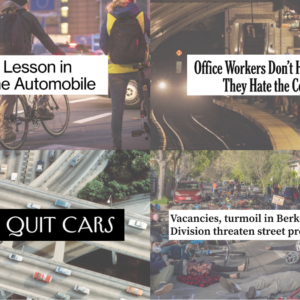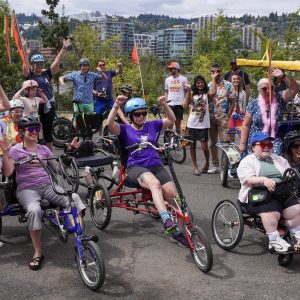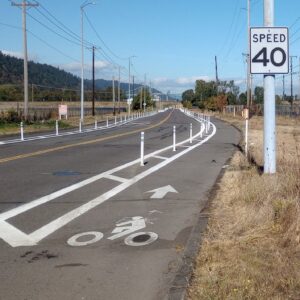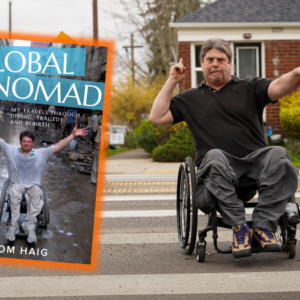A new documentary looks at transportation activism in a way many of us rarely see: multinationally.
“Bikes vs. Cars,” made by Swedish director Fredrik Gertten and drawing on characters in Sao Paulo, Los Angeles, Toronto and Copenhagen, will screen at the Hollywood Theater at 7:30 p.m. next Thursday, followed by a post-show discussion panel and party at the nearby Velo Cult bike shop.
Advertisement
A successful Kickstarter project from 2013, Bikes vs. Cars is now on a global tour that has gotten mixed reviews. If its adversarial name will put off some potential viewers, well, at least its underlying philosophy is said to match. Here’s the director being interviewed by the Guardian in May:
“Car dependency,” Gertten says, “is a disease for society. If you’re dependent on having a car every day, you have lost your freedom. It’s very sad. Most people are unhappy in traffic. The people who bike their cities, they become city-lovers. When you’re in a car, you don’t see the city, you are only watching the road. On a bike, you can see the sky, you can see the trees. People get to know their countries in a different way.”
The way he describes it, which comes across even more intensely in the film, is not so much a clash between bikes and cars as a battle of love and hate. How do you know the contours of where you live? Do you dart across them like an urban hummingbird? Or do you crawl sightlessly along them in a tank?
The man may be strident, but it’d be hard to say he’s wrong.
Bikes vs. Cars is showing as part of the Portland Ecofilm Festival. Tickets to the film are $8 for adults and $6 for seniors, students and children 12 and under.







Thanks for reading.
BikePortland has served this community with independent community journalism since 2005. We rely on subscriptions from readers like you to survive. Your financial support is vital in keeping this valuable resource alive and well.
Please subscribe today to strengthen and expand our work.
“The reality is that there is not one city in the entire world that has solved the issue of mobility through the private car – none.”
That, my friends, encapsulates pretty much everything we need to know. Pity it always falls on deaf (and greedy) ears.
Cars are fun and they go fast.
Looks fun. Thanks for the alert, Michael.
The title rubs me the wrong way, but it looks interesting nonetheless…
I know what you mean.
But at the end of the day it boils down to some version of this, wouldn’t you agree? I am no fan of zero sum logic, but the ubiquitous cars are the problem. Without coming up with a strategy for phasing them out, we’re going to make no progress.
Adding a person on a bike to the mix is a win for everyone.
adding 100,000 people on a bike is a win for everyone.
Adding a person driving a car to the mix is a loss for (nearly) everyone.
Adding 100,000 cars to the mix is an unmitigated disaster for everyone.
Actually I do agree, mostly. In this case I’m less troubled by the logic than I am by the assumption of competition and aggression that’s implied by the use of “versus.”
But I suppose the bottom line is there is an ongoing series of “either/or” “this vs that” choices made in our cities, only it’s been so one-sided for so long that it starts to take on the sheen of inevitability. Maybe it’s ok to acknowledge that.
And then there’s the false modesty of the elected officials who occasionally are heard proclaiming that they don’t want to get into the modal wars conversations, that they want to steer clear of all that. But given the asymmetries of long standing I find this to be a lame copout, an unwillingness to face this particular, dissonant music, acknowledge that there are lessons in understanding how we got here.
CARS MAN! WHY!!!
“On a bike, you can see the sky, you can see the trees. People get to know their countries in a different way.” This statement applies to most places in the world, but I can’t help but admit that I don’t feel it applies to most Portland bicyclists. When I read this statement and thought of Portland I read:
“When you’re a typical Portland commuter cyclist, mashing along at 20+ mph, fighting to optimize the shifting of your gears to keep up with all the other racing cyclists, you don’t see the city, you are only watching the road. The typical Portland commuter cyclist does not see the sky, does not see the trees. Portland cyclists do not get to know their city much better than motorists.”
I feel this every time I bike along the Hawthorne Bridge or ride up Williams during rush hour, among other places.
That is a good point. On a street with no cars, it’s much different than sharing a 5-10ft sidewalk which is packed with pedestrians and bikes. We should have 8-80 facilities which work for 3-30mph. Poorly timed stop lights, 2-stage left turns, and jug-handle crosswalks probably add to the commuter frustration and conflict between people biking at different speeds.
I can see trees and sky perfectly well on my bike at 20 mph.
“I feel this every time I bike along the Hawthorne Bridge or ride up Williams during rush hour, among other places.”
If a fast cyclist is threatening others then by all means call them out but otherwise it’s a victimless “crime”.
If hawthorn is too aggressive you can always take the “Peoples bridge.” But it wont matter. Come rain time you wont be here with us.
I agree with Gerald that there is far too much close passing on the Hawthorne bridge and on Williams. If you are going to fast give others lots of space — and by lots I mean 5+ feet.
too fast. (need edit function)
Yeah well. I’m passing you with no hands while looking at all the sites. Learn to ride or increase your gearing.
Gerald, hawthorne and williams are some of the worst of the worst. Too many riders on sub-par facilities.
Come and see how awesome the commutes on Terwilliger, Hewitt, Montgomery and Kingston are.
Good streets Andy. I do them weekly or more.
What was that video even about?
did you watch it?
I thought the film was great. No grand conclusions, but a sharp eyed but also very personal view of the power structures and the long struggle to chip away some space for biking.